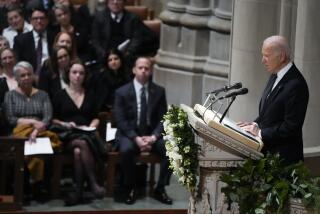Betty Binns Fletcher dies at 89; liberal U.S. appeals judge
- Share via
Judge Betty Binns Fletcher, considered a liberal stalwart of the 9th U.S. Circuit Court of Appeals for decades, died Monday in Seattle. She was 89.
The 9th Circuit announced her death but did not give the cause.
Appointed to the bench by President Carter in 1979, she was known for rulings upholding affirmative action, allowing claims of workplace discrimination to proceed, overturning death penalty cases and protecting the environment. She was one of the first female partners at a major law firm in the country, and the second woman appointed to the 9th Circuit.
“She had experienced discrimination herself in her life, and her perspective included looking out for the downtrodden, the little person — but always within the framework of the law,” said Robert Lasnik, a U.S. District judge in Seattle.
Fletcher kept hearing cases until the end, he added, and she remained sharp even as her body failed her.
“I think I bring a set of values and viewpoints to the court, and there is little enough of that now,” she told The Times last year.
Her son William A. Fletcher is a 9th Circuit judge whose appointment was held up by Republicans in the U.S. Senate in the 1990s.
In 1996, Republican Sen. Orrin Hatch of Utah insisted that because of an obscure, 19th century anti-nepotism law, Betty Fletcher needed to take senior, or semi-retired, status before her son could join the court. That would free up Fletcher’s seat to be filled with an appointee acceptable to then-U.S. Sen. Slade Gorton (R-Wash.) .
Fletcher agreed — but instead of slowing down as a semi-retired judge, she maintained a full caseload.
“Throughout her life people underestimated her,” said U.S. Atty. Jenny Durkan of Seattle. “The thought that taking senior status would mute her voice or her ideas was a huge miscalculation.”
Durkan added: “When I was growing up, there were not very many women lawyers in the community. She was one of the first and most accomplished, and a real inspiration for me.”
Fletcher was born March 29, 1923, in Tacoma, Wash., where her father was a prominent lawyer. When she was young, he would take her to his office on weekends and sometimes let her skip school to attend his trials. In an interview for an American Bar Assn. oral history project, she recalled that she always knew she would be a lawyer.
She began attending Stanford University at age 16, and during World War II, when many men had gone off to fight, the law school there began letting female students take law classes to keep the professors busy. Fletcher graduated from the University of Washington’s law school in 1956, and immediately ran into trouble: Law firms weren’t hiring women.
“Prejudice came down on me like a ton of bricks because … the professor who was supposed to get interviews for graduating students never got one for me,” she recalled. “So I pounded the pavement with my resume and would just go in cold and say I wanted to see the hiring partner. The receptionist always thought some secretary was getting sacked, so I would get in and get the interview.”
She was finally hired by a Seattle firm and later served as the first female president of the King County Bar Assn. Among her clients was U.S. Supreme Court Justice William O. Douglas.
Fletcher’s husband of 69 years, University of Washington law professor Robert Fletcher, died last year. She is survived by her four children, eight grandchildren and three great-grandchildren.
More to Read
Start your day right
Sign up for Essential California for the L.A. Times biggest news, features and recommendations in your inbox six days a week.
You may occasionally receive promotional content from the Los Angeles Times.




















































